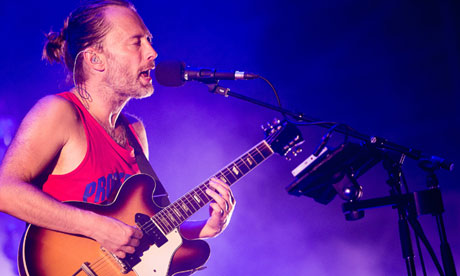
Britain's biggest musicians' union has entered the growing row over Spotify, demanding that the music streaming service draw up a new minimum pay deal for artists.
The Musicians' Union, which has more than 30,000 members throughout the industry, said it was pushing for a collective pay agreement modelled on the royalties paid by BBC and commercial radio stations. Spotify pays artists as little as 0.4p per stream, which means that a song that had a million plays would earn its performer just £4,000.
By contrast a three-minute song played on Radio 2 generates £59.73 for the songwriters and another similar sum to be split between the label and the performing artists. This 50/50 split is being advocated by the union, although the remuneration itself would be significantly more modest.
The latest row over Spotify's royalty payments began last week after Radiohead's frontman, Thom Yorke, and the band's producer, Nigel Godrich, pulled songs from the streaming service, the latter complaining that " new artists get paid fuck all with this model".
Stephen Street, who produced Blur's Parklife album, offered a swift riposte, accusing Yorke of hypocrisy, pointing out that Radiohead devalued digital music by allowing fans to download their In Rainbows album free in 2007.
John Smith, general secretary of the Musicians' Union, said the consensus among its thousands of members was that royalty payments made by Spotify, which offers unlimited access to 20m songs to subscribers who pay monthly fees starting at £5, were "unfair".
He said: "The argument that has kicked off this week is absolutely right and it really is hard, particularly for emerging artists, to make a decent amount of money.
"The streaming model should be able to work to the benefit of performers. We'd like to see a realignment of the intellectual property rights that govern all this in order to be fairer to artists. In the world of BBC radio and commercial radio, licensed by PPL [ Phonographic Performance Limited] or PRS [the UK's music royalty collection society] for composers, there is a division of that licence - 50/50 - between record companies and performers that includes everyone from the famous artists right down to the triangle player, and we'd like to see something similar for this kind of thing."
One artist, singer-songwriter Tom McRae, said the argument that Spotify would prove to be the salvation of the music industry - because it negates the threat from piracy and generates income - had failed. He said Spotify had "pulled the wool over fans' eyes, letting them believe they're supporting the artists by using a legal streaming service which pays out royalties to the bands.
"Friends and family tell me with pride how they listen to my earlier albums on Spotify, in the knowledge that every time they listen I'm earning money. I haven't got the heart to tell them that if they listened every hour of every day for the rest of their lives it wouldn't add up to the price of a round of drinks."
McRae chose not to make his last album available on Spotify. He also removed other albums to which he owns the rights in order to preserve the sales of downloads and CDs. He said: "If the main source of income for recorded music becomes streaming royalties, everyone except the record companies is screwed. No surprise to learn, then, that the majority of financial backing for Spotify comes from the major labels."
Spotify states that by the end of this year it will have paid out around $1bn (£660m) to rights holders. "We're 100% committed to making Spotify the most artist-friendly music service possible, and are constantly talking to artists and managers about how Spotify can help build their careers," it said. It added that its goal was to "provide the financial support to the music industry necessary to invest in new talent and music".
A spokesman said: "We've already paid $500m to rights holders, and by the end of 2013 this will have reached $1bn. Much of this money is being invested in nurturing new talent and producing new, great music."
www.yahootrend.com
0 comments Blogger 0 Facebook
Post a Comment